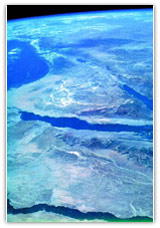
Background:
In recognising that the termination of Phase 1 of the SAP in 2005 created a renewed opportunity to galvanise regional conservation enthusiasm and action, PERSGA’s Secretary General, Dr. Ziad Abu-Ghararah, launched the Shared Vision and Confidence Building Programme initiative during the Sea to Sea Forum held in February 2005 in Cairo. The goal was two-fold: to reform PERSGA’s Business Plan and organisational structure to maximise the efficiency of PERSGA itself, as well as to develop the capacity of member states to cooperatively address environmental concerns and to better maintain the sustainability of the region’s resources.
 The comprehensive five-year Framework of Action (2006-2010) that transpired from this initiative, spells out PERSGA’s current mandates and priorities. The Framework provides a local, national and regional platform for multi-sector cooperation that has the capacity to address concrete targets in terms of desired institutional and operational changes, as well as social, economic and environmental needs. It specifically promotes the need for wide-spread participation and dedicated regional cooperation to achieve the WSSD targets for sustainable ocean and coastal development, as well as the Millennium Development Goals.
The comprehensive five-year Framework of Action (2006-2010) that transpired from this initiative, spells out PERSGA’s current mandates and priorities. The Framework provides a local, national and regional platform for multi-sector cooperation that has the capacity to address concrete targets in terms of desired institutional and operational changes, as well as social, economic and environmental needs. It specifically promotes the need for wide-spread participation and dedicated regional cooperation to achieve the WSSD targets for sustainable ocean and coastal development, as well as the Millennium Development Goals.
In working to strengthen sustainable development planning and effective marine and coastal management in each of the PERSGA Member States, the Shared Vision Program highlights the following:
-
A healthy environment that maintains its diversity of species and habitats, its functional integrity and resilience, and its pristine areas.
-
Shared goals and integrated precautionary management programs among the coastal nations of the Red Sea and Gulf of Aden that work to conserve the region’s biodiversity.
-
Sustainable development and multiple use that promotes non-destructive activities which can continue indefinitely to maintain the widest range of opportunities for appropriate sustainable use, while at the same time that do not adversely affect the ecological integrity of its natural systems.
-
Regional capability for marine emergency planning and response.
-
Maintenance and enhancement of values related to a healthy environment, including aesthetic, ecological, economic, cultural and social values, and ensuring the enjoyment of marine and coastal resources for present and future generations.
-
Knowledge-based decision making.
-
Strong partnerships and informed, committed and active stakeholder involvement across all sectors of society.
-
committed, prosperous and vibrant coastal communities who benefit from, and actively contribute to, the above shared vision.